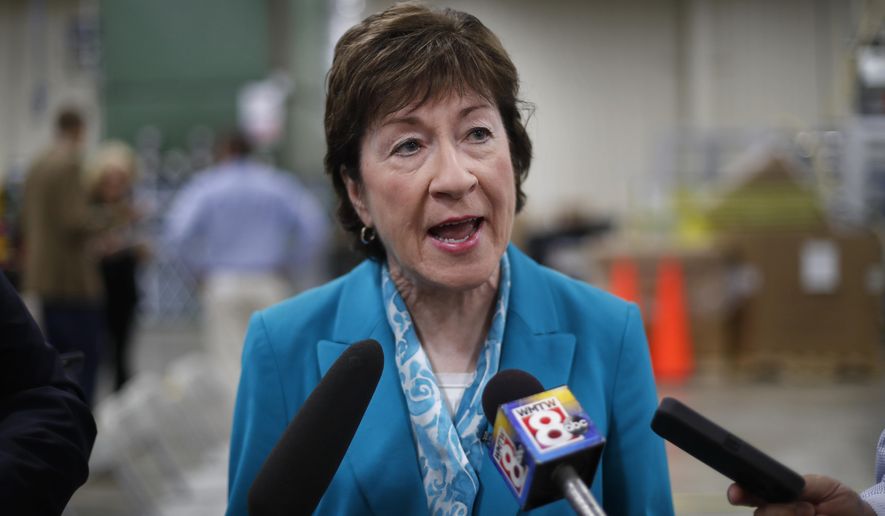The White House and Senate Republicans vowed Sunday to press forward with Republicans’ latest Obamacare repeal effort with a vote this week, hoping to head off another disastrous floor failure even as opposition mounts.
At least three Republican senators have said they aren’t voting for the bill as is, and several others are reluctant to get on board. Republicans can afford to lose the support of only two of their own senators if, as expected, all Democrats toe the party line against any Republican efforts to repeal or replace the Affordable Care Act.
Sen. Lindsey Graham, South Carolina Republican and one of the co-authors of the bill, said he hopes Republican can rally in time to meet an end-of-month deadline for passing a repeal under the 2017 budget, which allows them to avoid a Democratic filibuster.
“I think we’re going to get the votes,” Mr. Graham said in an interview that aired Sunday on ABC’s “This Week.” “We’re moving forward, and we’ll see what happens.”
But Sen. John McCain, Arizona Republican and one of Mr. Graham’s close friends, said Friday that he will vote “no,” and Sen. Ted Cruz, Texas Republican, said Sunday that he is not supporting the bill as it stands. Sen. Rand Paul, Kentucky Republican, said last week that he was opposed.
Those three opposing votes are enough to sink the legislation, and at least three other Republicans are also in doubt.
Sen. Bill Cassidy, Mr. Graham’s co-author, said the bill’s supporters likely will try to rewrite the bill to entice more votes, underscoring the evolving, fluid nature of the process, which has earned criticism from key Senate Republicans.
As it stands, the Graham-Cassidy bill would repeal Obamacare’s mandate that most Americans either purchase health insurance or face fines. It would also take money currently spent on subsidizing expanded Medicaid and insurance purchases on the Obamacare exchanges, pool the funding and return it as block grants to the states, with instructions to create systems that work for them.
Republican leaders are pitching the bill as potentially the last chance for lawmakers to fulfill their long-standing pledge to repeal Obamacare.
President Trump said Sunday that Republicans have been talking for seven years about repealing and replacing the law and now have a chance to follow through.
“I don’t know what they’re doing, but you know what? Eventually we’ll win, whether it’s now or later,” Mr. Trump told reporters.
White House director of legislative affairs Marc Short said on “Fox News Sunday” that the effort is not dead.
“We’re trying to win over the support of the last couple of senators to get there. As you know, there’s no Democrat support for it,” Mr. Short said.
This is the Senate Republicans’ third attempt at a repeal. The second one failed when Mr. McCain joined Republican Sens. Lisa Murkowski of Alaska and Susan M. Collins of Maine in voting with all Democrats against a broader repeal.
Ms. Collins said Sunday that it was difficult to imagine a scenario that would persuade her to support the latest bill.
“I have a number of serious reservations about it,” Ms. Collins said on CNN, listing issues tied to the effect of the bill on Medicaid recipients, on costs and coverage, and on people with pre-existing conditions such as asthma, cancer and diabetes.
Mr. Cruz on Sunday said he is not fully supportive but wants to find a way to get to “yes.”
“I want to get there because I think Obamacare is a disaster,” Mr. Cruz said at an event in Texas hosted by The Texas Tribune.
He said it depends on what is in the package and that the Graham-Cassidy legislation has some “very good elements.”
He said he likes the provision that takes federal Medicaid expansion money under Obamacare and gives it back to the states through block grants.
But the block grants are exactly what Mr. Paul said he doesn’t like about the bill. He said giving money to the states leaves too much of Obamacare intact.
“I can’t in good conscience vote to keep it, all of the spending. Because once we do, the Republican name will be on health care. And this isn’t going to work. You’re going to end up having Republicans to blame for a terrible health care system,” Mr. Paul said on NBC’s “Meet the Press.”
“They could remove the block grants from it. And then we could vote on what we actually all agree on,” he said.
The Senate Finance Committee is scheduled to hold a hearing on the bill Monday. The Congressional Budget Office is also expected to release top-line numbers on how the plan would affect spending, though as Mr. Cassidy indicated the legislative language could change in the coming days.
The Senate Health, Education, Labor and Pensions Committee had been working on a bipartisan bill to stabilize the individual insurance market before Obamacare enrollment begins Nov. 1. Insurers are supposed to sign contracts to participate in the marketplace before the end of the month.
But Chairman Lamar Alexander, Tennessee Republican, said the effort stalled out last week amid the hysteria around Graham-Cassidy and a Democratic push for government-run, single-payer health care.
He said negotiators couldn’t strike a balance between state flexibility under Obamacare — something Republicans want — and funding for “cost-sharing” payments that Mr. Trump has threatened to withhold.
The potential collapse of the Republican push, coupled with Mr. Trump’s ambivalence toward his predecessor’s signature program, leaves the insurance markets in limbo.
Sen. Patty Murray, a Washington Democrat who had been working with Mr. Alexander, said on Twitter that she is “at the table” and ready to pick up where negotiators left off, “as soon as this latest partisan approach is set aside.”
• Tom Howell Jr. can be reached at thowell@washingtontimes.com.
• David Sherfinski can be reached at dsherfinski@washingtontimes.com.




Please read our comment policy before commenting.